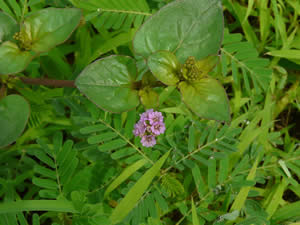Positive Health Online
Your Country

Ayurvedic Herbs as Healers - Punarnava and Ashwagandha
by Dr Sonica Krishan(more info)
listed in ayurveda, originally published in issue 174 - September 2010
Herbs are the 'medicinal plants' used in treating and curing ailments, as well as enhancing the wellbeing, vigour and vitality of an individual. Other than this, herbs have also been associated with providing seasoning, flavouring and essence to the food items. Today, herbs find immense usage in the field of medicine, food industry and also in the manufacturing of beauty products. The simple herbs that can be grown in the kitchen gardens find meritorious and handy use in treating day-to-day maladies. And particularly in recent years, herbs have found a lot of acceptance worldwide. This is because these are easy to use, safe with few if any side effects and are essentially an asset that puts our bodies in harmony with the nature.

Punarnava
Herbs have been always popular all over the world and with different communities. There are illustrations in The Bible about the use of various herbs for the benefit of the body's health. In Genesis, God said, "I have given you every herb bearing seed, which is upon the face of the earth. And every tree, in which is the fruit of a tree yielding seed; to you it shall be for meat." It is no doubt that today herbs are believed to be pure and natural sources that assure the fruit of good health. It is a known fact now that the herbs help to cleanse and purify the body and also help the body in preparing its own defence system against disease. Not only this; herbs also provide nutrition to the body. Unlike synthetic drugs, herbs might not produce instant results; yet in the long run, these offer a way to put the body in tune with the nature.
The Ayurveda Philosophy of Herbs as Healers
According to the ancient wisdom of Ayurveda, herbs may be used both in the form of food as well as medicine. And rightly so, herbs provided by Nature make the part and parcel of most of the Ayurveda medicines. Ayurveda claims the usage of herbs to be authentic as it gratifies and supports the very basis of holistic healing. The basic aim of Ayurvedic therapy is firstly to restore the health of a healthy individual, and secondly to do away the affliction of the diseased one. Therefore, in order to achieve either of these objectives, a herb comes into use.
Ayurvedic treatment rests on four pillars: doctor, patient, helper and drug. Drug is generally referred to the herb, which comes in extensive use in treating a disease.
The herbs are used on the principle of the existing properties, which tend to either increase or decrease the basic body humours present in the patient's body. The three humours are Vatta or the air, Pitta or the fire and Kapha or the phlegm. A balance in all the three humours ensures health. Yet, if either of the three is distorted - i.e. increased or decreased - from than their normal limits, this results into production of a disease.
The herb works on the simple principle that it generally tends to increase the humour which is similar in properties to that existing in the herb.
The drugs which more importantly are the herbs are believed to be made up of Panchbhootas or the five basic elements: earth, water, fire, air and ether. Similarly, our body is also made up of these five basic principles. Therefore, the herbs come to use in curing an ailment that occurs in the body. This further attributes to the presence of taste, after taste, properties and actions of the particular drug. These can be acknowledged by the help of the five sense organs: smell, taste, sight, touch and sound.
Two Healing Herbs - Punarnava and Ashwagandha
Although there are plentiful natural herbs that are immensely valuable as well as supportive so as to enhance the natural innate wellness, let us here relate to two such Natural Healers - Punarnava and Ashwagandha. These two herbs are rightly termed as healers as they hold superb remedial properties that have been bestowed upon us by Mother Nature. Of these two valuable herbs, whereas Punarnava tends to renew and revitalize the body systems, the herb of Ashwagandha confers anti-ageing and immunity boosting merits.
Punarnava
Derived from two Hindi words 'punar' which means again and 'nava' is new. Therefore a herb that is said to renew the body systems and all the more rejuvenates as well as revives the body is called Punarnava. The Latin name of the herb is Boerhavia diffusa and in English it is called as 'Spreading hogweed'.
Appearance of the Herb
The herb of Punarnava is green and leafy, approximately 2 to 3 feet long. The leaves are fleshy, rounded and contain small hair like out growths. It bears flowers during the rainy season which are mostly white or pink in colour. The root is hard, thick and somewhat whitish in colour.
Basic Properties of the Herb
Punarnava is sweet, pungent and astringent in taste and the after taste is also sweet. It is light and rough by nature and hot in action. Chemically, the main component is an alkaloid called Punarnavine.
Part of the Herb Used
The root, seed and the entire herb are used for medicinal purposes.
Medicinal Benefits of Punarnava
Boon for the Liver
Punarnava is Nature's gift for us, as it is highly advantageous for the liver. This herb is a natural toner of the liver. When the body has to fight an infection of any form, our liver is the vital organ that takes the entire stress. As a consequence, the patient is fatigued and lethargic and continues to be in this state for a long passage of time. Not only does he lose hunger and the power of digestion, but also the gentle radiance on his face. At this stage it is advisable to use Punarnava so as to restore health, stamina and vitality. This can be in the form of fresh juice extracted from the herb. In a number of disorders of the liver such as hepatitis, jaundice, iron deficiency anaemia, anorexia and sluggish liver etc; Punarnava comes as the drug of choice for an Ayurvedic physician. Research has established that this herb reconditions the liver, purifies the blood and aids in increasing the basic haemoglobin of an individual.
Improves Working of the Kidneys
This herb is diuretic and helps to subside any swelling in the body. Alternatively, there are a number of medicinal preparations, for example Punarnava mandoor, Punarnavashtak, Punarnava asav etc which may be taken under the supervision of an Ayurveda expert. Other than this, the herb, being a natural diuretic, is quite useful in treating the diseases of the urinary tract like dysurea and formation of urinary stones.
- Anti-oxidant Herb
- Studies have revealed the herb to possess anti-oxidant properties. Not only this, the herb of Punarnava is also recommended as a natural immunity booster;
- Natural Blood Purifier
- Punarnava is believed to be useful in purifying the blood and also the gastric juices.
- Combats Joint Pains and Oedema
- The herb Punarnava comes to use extensively to combat a swelling anywhere in the body. A paste made out of grinding the fresh herb is warmed and applied over the affected parts. This could relieve both the oedema and pain, especially in the patients suffering from Arthritis;
- Aphrodisiac Action
- This herb is a good aphrodisiac as well as energy tonic. For this purpose, the seed powder of the herb may be taken in a dosage of 1 to 3 grams along with a glassful of milk once or twice a day;
- Natural Detox Agent
- Punarnava also has anti-toxicological properties. Therefore the herb may be used both externally, as well as internally, in case of sting by poisonous animals, insects and reptiles like snakes.
What Ayurveda Implies
According to Ayurvedic text, Punarnava is believed to subside all the three body humours i.e. Vatta or the air, Pitta or the fire and Kapha or the phlegm. This quality of the herb owes to the specific properties that it contains. Being sweet, pungent and astringent in taste, it decreases an aggravated fire body humour. Also as the herb is hot in potency, it therefore tends to decrease the air and phlegm.
Dosage Recommendations
The juice extracted by crushing the fresh herb can be taken in a dose of 5 to 10 ml twice a day. Also, the powder of the seeds of Punarnava can be taken in a dosage of 1 to 3 grams approximately.

Ashwagandha
Ashwagandha
Another Ayurveda herb that is extremely beneficial in restoring as well as revitalizing the overall health of an individual is a herb called Ashwagandha. Not only this, this particular herb comes to use effectively for restoring the energy levels of an emaciated person and all the more significantly playing a substantial role in delaying the process of ageing. In the Ayurvedic texts, the herb of Ashwagandha is quite rightly regarded as a Rasayana.
Why Ashwagandha is a Rasayana
Rasayana is a particular wellness therapy that occupies a prime position in Ayurveda, and abides as a distinctive branch that deals with maintaining and ameliorating the body functions, including those of the brain. The word Rasayana is made up of two words: 'Rasa' which means humour of the body and 'ayana' that is a source. Rasayana is therefore regarded as the source of all the body humours. Evidently, All the natural herbs that help in increasing resistance against disease, enhancing physical as well as mental health and also aid in delaying the debility of ageing; are mainly termed as Rasayanas. The herb of Ashwagandha has the benefit of being entitled as Rasayana, owing to the exceptional properties it holds.
The Herb of Ashwagandha
The Latin name of the herb is Withania somnifera and locally in India it is known as Asgandh. The Sanskrit name Ashwagandha is derived from two words 'Ashwa' and 'Gandha', the combination of the two means that what smells like a horse. This medicinal herb, which grows 2 to 5 feet tall and bears yellowish-green flowers, is found more extensively in India in the regions of Himalayas. The root which is the part of the herb that is used for medicinal purposes is whitish-brown in colour, thick and sturdy and may extend to about 1 to 2 feet in length.
Part of Herb Used
The root of Ashwagandha is mainly used for therapeutic purposes.
Medicinal Value
Ashwagandha is light and slimy by nature and hot in potency. The taste is a combination of sweet, bitter and pungent and the after taste is sweet. Chemical composition of the herb includes glycosides, acid, starch, sugars and amino acids. Other than these, approximately thirteen alkaloids like trophine, anapherine, anahygrine etc supplement the composition.
Ayurveda Claims
Being slimy and hot by nature, the herb of Ashwagandha tends to cause a decrease in the Vatta or air and Kapha or the phlegm humours of the body. Thus, it is useful in treating the ailments arising from a distortion in either of the two humours.
Therapeutic benefits of Ashwagandha
* Energy Restorative Conduct
A powder prepared by pounding the roots of Ashwagandha may be taken in a dose of 3 to 6 grams along with a glass of warm and sweetened cow's milk. This energy tonic when taken regularly for some time is sure to boost the energy levels. This herb is also the drug of choice in case of weak and under-weight individuals. Ayurveda practitioners generally prescribe Ayurvedic preparation by the name of 'Ashwagandharishta'.
- Cure for Insomnia
- The herb of Ashwagandha is soothing and calming for the brain. It is recommended in a number of ailments that arise due to the mal-functioning of this vital organ. It has proved to be positively beneficial as a 'brain tonic' and in the troublesome ailment of loss of sleep. Try this home remedy - To about 5 grams of the powder of Ashwagandha prepared by pounding the roots, add half glass milk and half glass water. Cook the mixture on slow fire till the water evaporates. Then remove from fire, add sugar or mishri and take it warm just before retiring to bed.
- For Urinary Disorders
- Ashwagandha is a natural diuretic. The herb is therefore useful in the malady of diminished urination. An alkaloid formulation of the same is available in the market by the name of 'Ashwagandha kshar'. 1 to 2 gms is the suggested dosage to be taken along with lots of water.
- For Joint Stiffness and Pain
- For those suffering from the chronic ailments of joint pains like rheumatoid arthritis, osteo-arthritis, gout etc, the recommended dose of the powder of the herb is to be taken along with warm water after meals. In winters or in cold climates, externally a local massage of mustard or sesame seed oil along with the pounded root of Ashwagandha powder added to it proves beneficial.
- Boon for Women
- In women, ailments such as vaginal itch, inflammation, swelling in the uterus, leucorrhoea, loss of hunger and lethargy, the herb of Ashwagandha is again found favourable. The medicinal preparations of Ashwagandha may be taken, or simply pound the root and take the same mixed into honey or ghee. This also acts as a natural aphrodisiac.
Dosage Recommendations
Powder is prepared by pounding the root may be taken in a dose of 3 to 6 grams approx. along with warm milk or water.
Sources of Information:
1. The Ayurvedic Pharmacopoeia of India.
2. Dravyaguna vijnana by Prof. PV Sharma.
3. Charaka Samhita of Agnivesh by Vaidya Sri Satya Narayan Shastri.
Comments:
-
Rajnish KumarGoyal said..
Dear Sir, I am suffering from Hepatitis Band am taking Antiviral drug Entecavir for the last 6 months. As a result, the virus count in my blood had come down to "Non detectable", but still HBsAg is positive, meaning I am still infected. Otherwise I am very fit, do my exercises and good diet. My Haemoglobin etc. are all very good. I have both Punarnava and AshwaGandha in my kitchen garden. Please advise whether I should take these herbs along with the medicine I am already taking? If yes, how and in what quantity? Regards.
-
kasimir said..
her in europe my doctor told me, that i cann use the chemical medicine with natural medicin. i am doing this. the dosage i do my self. all the best.kasimir
-
naveed ahmad said..
can we use punarnava fresh root leves wich is not dray
-
kelly said..
i suffer sometimes from my hands and arms tingling and also pins and needles. sometimes my legs also. What ayerdediv herbs must i take for this?
-
yash pal bakshi said..
sir,
I am suffering from jaundis how can i take punarnava
-
naranbhai patel said..
I am 80 years old feeling fit I like to take Aswagadha and Purnva powder where to get it best quality?
-
Prakash Ranjan said..
I am suffering from lever cirrhosis and for that undergoing alopathic as well as homeopathic medication. Can I take punarnava for lever rejuvenation
-
tushar naik said..
My problem of lever cirosis is different and i am taking allopathy medicine.
Alongwith this i would like to take Purnarnava for reducing swelling in my feet.
Pl suggest
-
jak said..
ok
-
NIVVA said..
is ashwagandha & pounerava are taken combination? what are the side effect? my age is 52.Due to menapose i m gainig weight?what are the other long term medicine without side effect and name of the company.
-
Ca amar deep said..
sir as my mother suffering from kidney failure for more than two years and she is going for dylasis three times a week .... can she take punarnava....in what fom she can take ....and where can I get...we from chennai...thank you..
-
shaikh tarriq said..
How to take punarnava medicen for liver disease, stamock diesese, kidneys dieses how much we can take dose
-
Oluremi ojomo said..
am a 65years old woman suffering from lmyhpoedema in my two thights that have become swelling. my movement is impaired as result and my left leg is shorter. most of the swelling are accumulation of water. am big in the lower areas. i go to the rest-room about 3 to 4 times in the night. i use some duretics drugs but the swelling is still there. what conbination of purnanawa must i use to get myself back to shape.
-
Richard said..
I have restless leg syndrome. What do you recommend to help this problem. Many thanks. Richard
-
HEMANTA BHAKAT said..
I want the tree.
-
wilfred anthony said..
I am 34 yrs old having CKD and on dailysis twice a week. On Dailysis for around 2 yrs. pls confirm if punarvaha can solve my problem. if yes, how do I take dosage and where do I get the herb in mumbai.
regards
wilfree
-
J Canell said..
where can I purchase the best choice of herbs for 3rd stage Chronic Kidney disease?
-
dimple Pandya said..
I m suffering from lupus nephritis.i want to know that which contain n does of punarnava I can take...
-
Gunnamahenderreddy said..
Punarnava which purpose use
-
pratima said..
My husband is suffering from CKD. Can he be given punarnava swarasa. How to get it & how to take it ?

